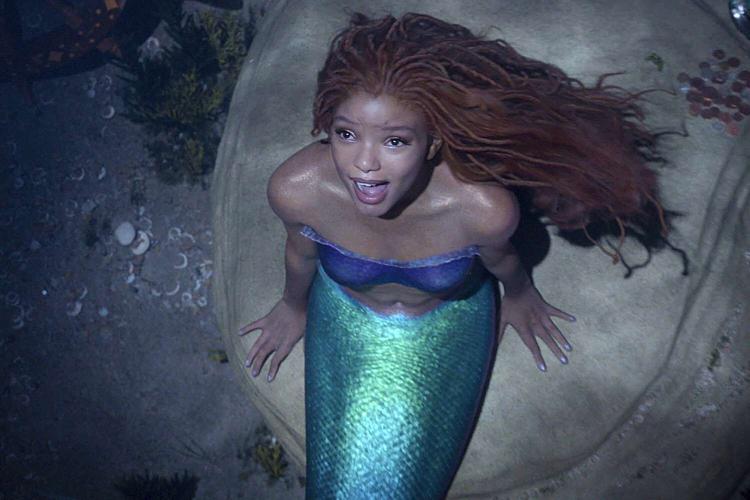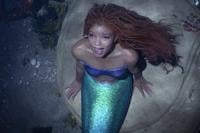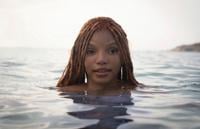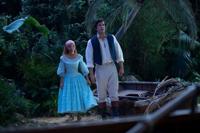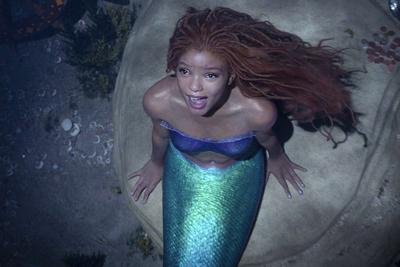The 1980's and 90's were considered the Disney renaissance, a decade or so when Walt Disney Animation was producing films that would become the most successful and most iconic features in the company's history. The Little Mermaid (1989) was the first title in this so-called renaissance. Since the 2010's, Disney has leaned hard into making live-action adaptations of its classic animated films. The corporation has already remade four from its renaissance era, including Beauty and the Beast (2017), Aladdin (2019), The Lion King (2019) and Mulan (2020).
It's perhaps unfair to say, but this remake feels so derivative of all those previous four, as well as other Disney remakes. It's unfair because this film is based on work that came first in that renaissance era. The original Beauty and the Beast, the original Aladdin, the original The Lion King and the original Mulan all came out after that now 1989 classic. Nevertheless, Disney adapted those later films before they adapted this one. Seeing the success of the original The Little Mermaid, Disney clearly copied a lot of the story elements into the subsequent films in that renaissance era.

I'm sure critics at the time in the early 90's probably noticed Disney copying itself during that renaissance period. Being only a prepubescent child at the time, I didn't notice. Being a critic now 30 years later, those copied and repeated story elements and themes are more blatant. Those elements include a protagonist who literally wants to leave their home to go live somewhere else. It also includes a romance that has one person often forced to be something they're not. It also includes a villain who operates out of jealousy and wanting the power or authority of another.
Even though these are repeated elements, the filmmakers behind the animated films were able to render them in very entertaining ways. They pulled audiences into the world and caused you to connect with the characters and put aside any such nitpicks. This is in general the requirement when one is doing a remake. Sequels are charged with the same thing, but whether a remake or sequel, after a while, it can feel derivative or tautological.

Halle Bailey is an African American pop star who is making her feature debut in a leading role. She plays Ariel, a mermaid who lives off the coast of some Caribbean kingdom. It's likely set in the early 19th century, which is when author Hans Christian Andersen wrote the fairy tale on which Disney's original film was based. Ariel is fascinated with humans who live on land. She collects artifacts from shipwrecks or that get discarded from seafaring vessels. This is in spite of her father, King Triton, played by Javier Bardem (Dune and Skyfall). Triton in fact hates humans because one killed his wife and due to the pollution.
If anyone saw ABC's Cinderella (1997) with Brandy Norwood, Whitney Houston and Whoopi Goldberg, this film is similarly standing out for its diversity in its casting. That 1997 production was only on television. In terms of theatrical releases, Aladdin (2019) beat this one to the punch with Will Smith being the lead of that remake. However, both Aladdin and this one don't lean into the fact that a Black person is the lead. One could infer racial commentary here in the subtext, but if so, it's very buried and not overt.

Her casting isn't simply affirmative action though. Bailey's performance here is great. Obviously, she has an incredible singing voice. Her beauty is also apparent. However, this film has many scenes where Bailey's Ariel can't speak and her acting is all in her face or just her body language. In those wordless, fish-out-of-water scenes, she still shines.
Jonah Hauer-King (World on Fire and A Dog's Way Home) co-stars as Prince Eric, a strapping young man who lives in a castle in that kingdom along the Caribbean Sea. As such, his preference is to travel by ship to different lands and countries, as part of his kingdom's trading industry. His mother is Queen Selina, played by Noma Dumezweni (The Watcher and Black Earth Rising), who forbids Eric from going to sea because she's noticed numerous shipwrecks and thinks the waters are cursed. Prince Eric is going against his single parent, just like Ariel, and just like the characters in Beauty and the Beast and Aladdin.

Melissa McCarthy (Ghostbusters and Bridesmaids) is the other major actor in live-action. She plays the villain, Ursula, a sea witch in the form of a half-woman and half-octopus. Her preferred color is the color purple. She's basically derivative of the villains from Aladdin and The Lion King. Again, it's not fair because the original 1989 animation on which this is based came out before Aladdin and The Lion King. Yet, she's basically Jafar and Scar all rolled into one. Yet, for Broadway fans, she's also the devil from Damn Yankees (1958).
The CGI in the final battle with Ursula is just as bad as the CGI in the final battle of the live-action Aladdin, ironic because the exact same thing happens in both. The CGI otherwise was fairly well done in terms of the colors and designs. Of course, people will compare it to James Cameron's Avatar: The Way of Water (2022) because both have large chunks taking place under water. Without question, Cameron's film has better visuals, particularly in its submerged sequences. The visuals here are immersive and seeing Bailey and McCarthy's characters swimming and existing in the ocean works and feels seamless enough.

Ironically, the section of the film that takes place on land is the better realized section. The scenes on land are sweet and charming, depicting the romance where Ariel is a stranger in a strange land and Eric truly is the handsome and dashing prince. We seem them bond over things that are about exploration and learning. I was rather taken with it.
Rated PG for action/peril and some scary images.
Running Time: 2 hrs. and 15 mins.
In theaters.


